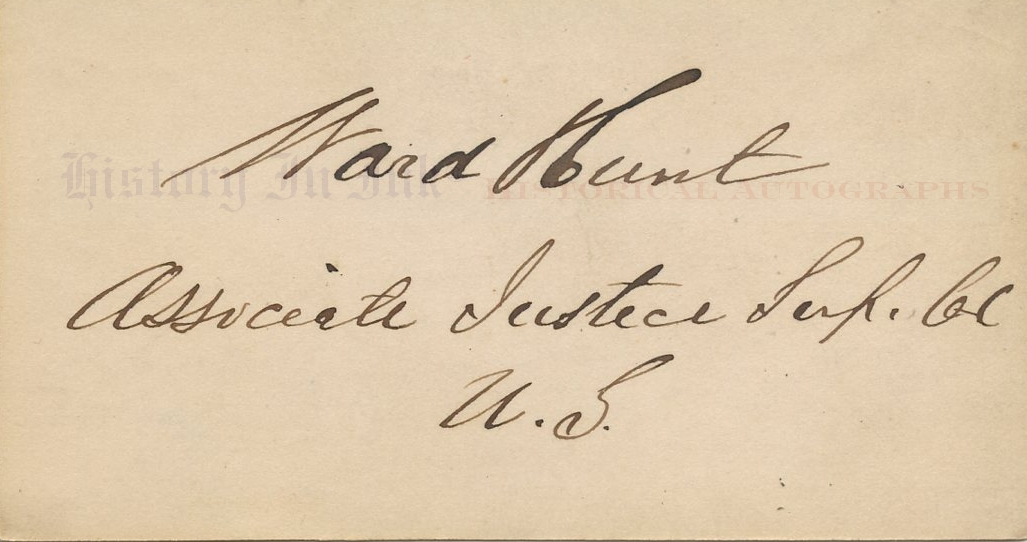
1619725
Ward Hunt
Very scarce Court-date signature of Justice Hunt
Ward Hunt, 1810–1886. Associate Justice, Supreme Court of the United States, 1872–1882. Scarce signature and title, Ward Hunt / Associate Justice Sup. Ct. / U.S., on a 2" x 3½" card.
Huntʼs autograph material is scarce enough overall, and that from his time on the Supreme Court is scarcer yet. Our review of auction results has found only eight examples of Huntʼs signature and but one autograph letter signed offered over the past 41 years.
This is an excellent example of Huntʼs signature. He has boldly signed his name and written his title as an Associate Justice in dark brown ink. The signature is undated but undoubtedly predates the paralyzing stroke that Hunt suffered in 1878, six years into his tenure on the Supreme Court.
Hunt was originally a Jacksonian Democrat. But he split with the party over the issue of slavery, supported the Free Soil ticket, and voted for Martin Van Buren for President in 1848. He then participated in founding the Republican Party in New York.
Hunt served as Chief Judge of the New York Court of Appeals, the stateʼs highest court, for about a year. At the request of his political mentor, the influential New York Senator Roscoe Conkling, President Ulysses S. Grant appointed Hunt to the Supreme Court in 1872.
In 1878, Hunt suffered a stroke that paralyzed him and prevented him from participating in the Supreme Courtʼs work. He nevertheless remained on the Court because, by law, he could not qualify for a full retirement pension until he had served ten years and turned age 70. As a result, Hunt was largely a back-bench Justice. He voted with the majority in all but 22 cases and wrote but four dissents. Congress encouraged him to retire by waiving the pension requirements if he would step down within 30 days, and he did so.
Perhaps Huntʼs most notable decision was his 1873 opinion, sitting as a Circuit Justice, finding womenʼs suffragist Susan B. Anthony guilty of violating New York law by voting in the 1872 congressional election when the state limited the right to vote to men. Anthony argued that the Fourteenth Amendment to the United States Constitution gave her rights that overrode state law. Hunt ruled otherwise. “The right of voting, or the privilege of voting, is a right or privilege arising under the constitution of the state, and not under the constitution of the United States,” Ward wrote. Although particular restrictions denying the right to vote to one of too young or too old an age, or one “having gray hair,” or one not having “the use of all of his limbs" might be “unjust, tyrannical, unfit for the regulation of an intelligent state,” he wrote, nevertheless “if the rights of a citizen are thereby violated, they are of that fundamental class, derived from his position as a citizen of the state, and not those limited rights belonging to him as a citizen of the United States." He concluded:
Miss Anthony knew that she was a woman, and that the constitution of this state prohibits her from voting. She intended to violate that provision—intended to test it, perhaps, but, certainly, intended to violate it. The necessary effect of her act was to violate it, and this she is presumed to have intended. There was no ignorance of any fact, but, all the facts being known, she undertook to settle a principle in her own person. She takes the risk, and she can not escape the consequences.
United States v. Anthony, 24 F. Cas. 829, 830–31 (C.C.N.D.N.Y. 1873).
This card is in extra fine condition. Because of its scarcity, collectors of Supreme Court material should take care not to let this piece pass by.
Unframed.
_____________
This item has been sold.
Click here to see other Supreme Court items
that we are offering.



